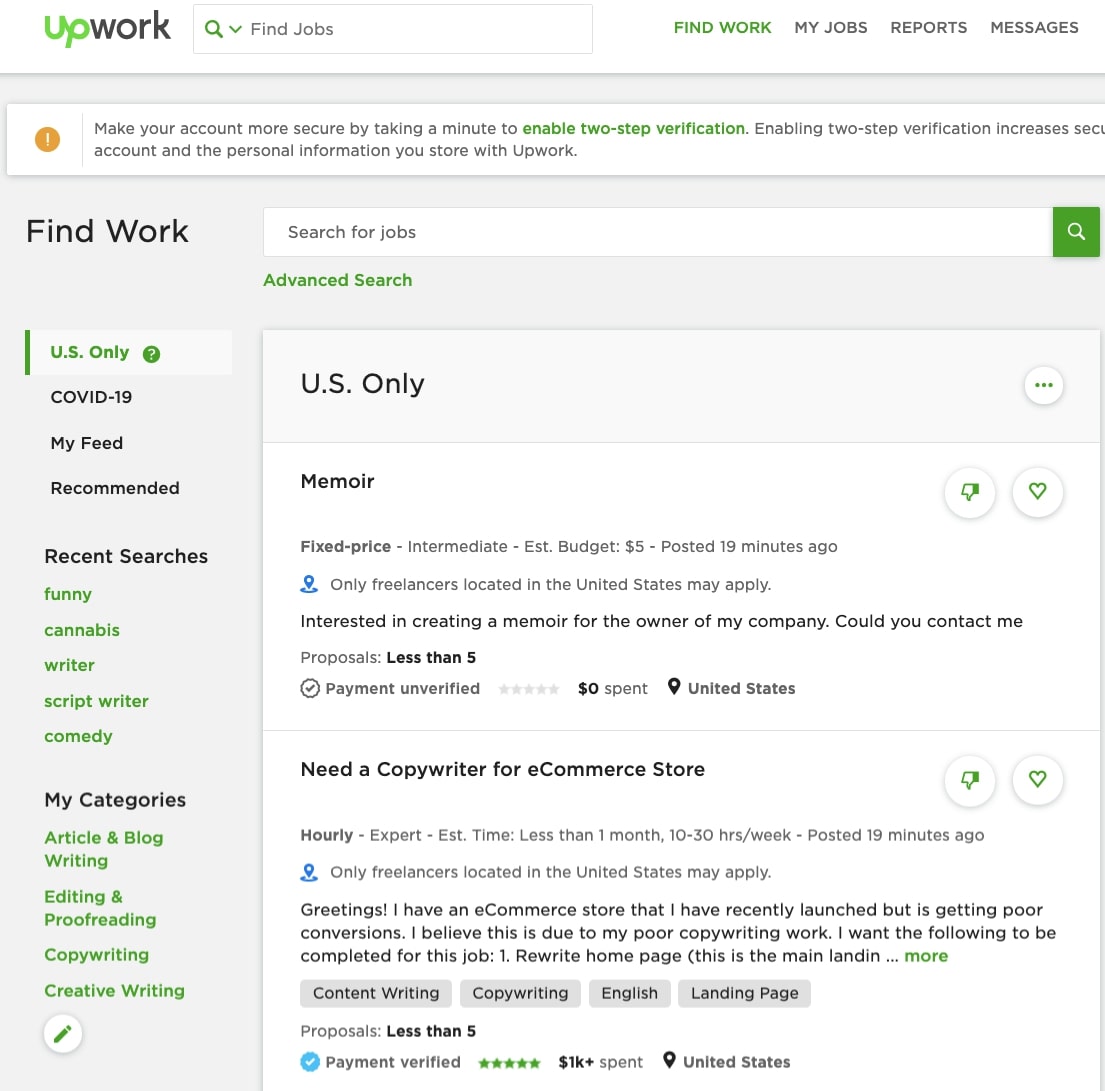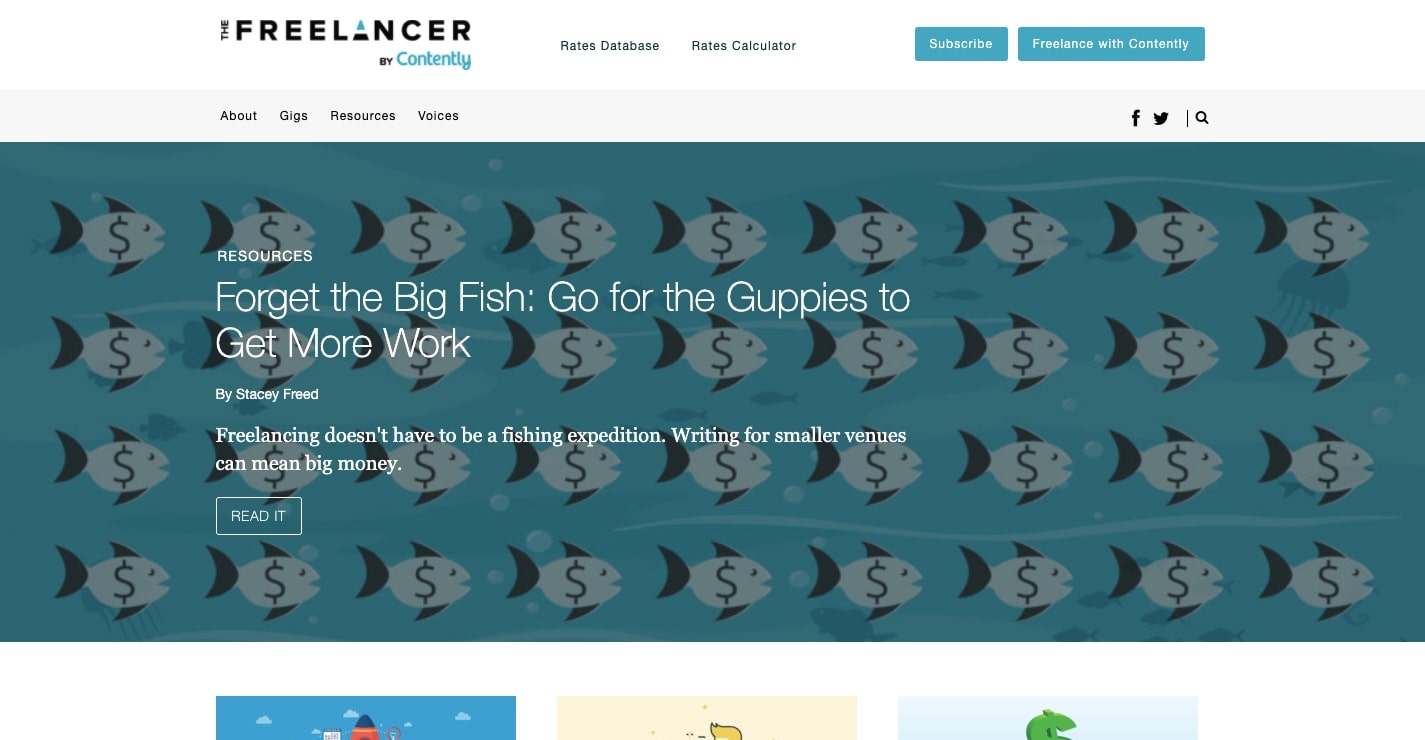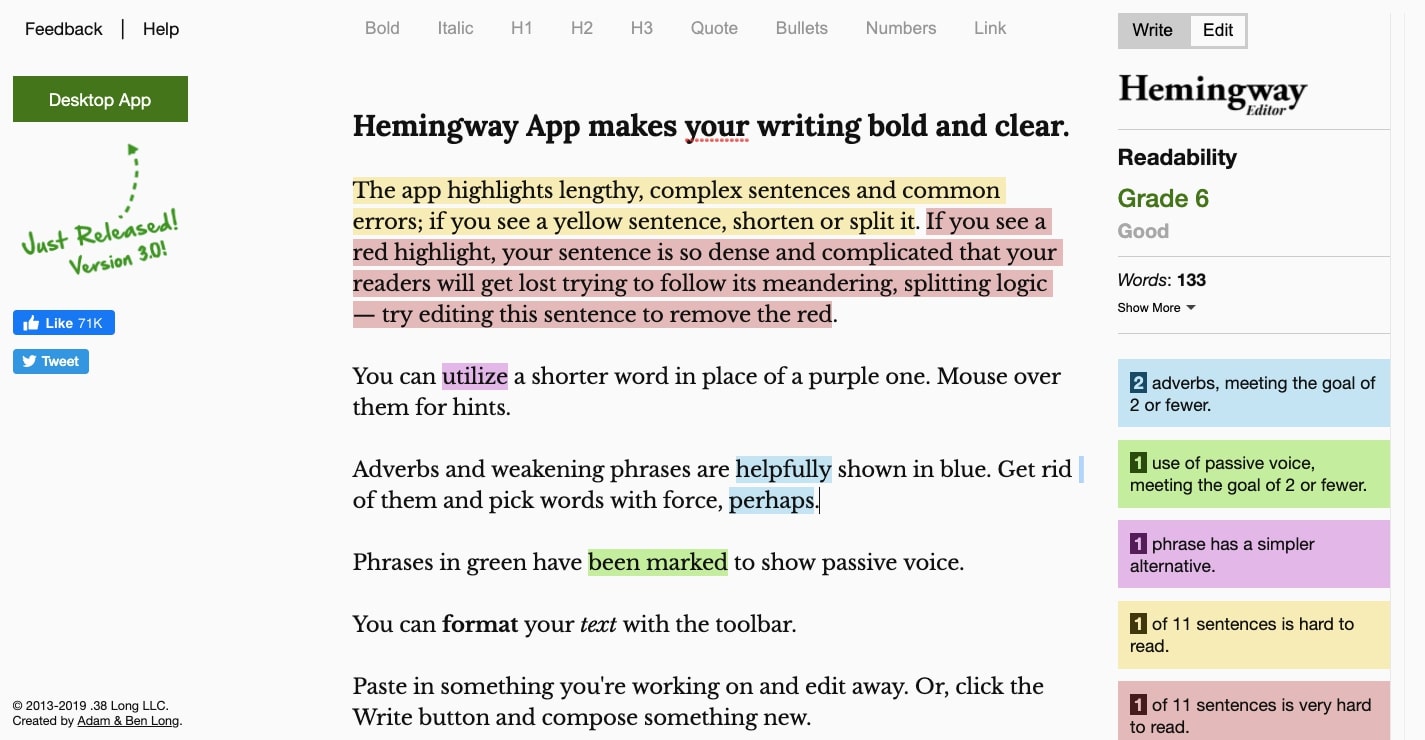What if you could have a writing career on your own terms with complete freedom over who you choose to work for? There’s no definitive formula for finding success, but these 13 steps will give you momentum in launching your own career as a professional freelance writer.
Have you been thinking about becoming a freelance writer?
Maybe you need a change from the confines of the cube life and would like the freedom that being your own boss brings.
Or perhaps you just want to make a bit of extra money outside of your day job, while putting into practice your love for words and exploring those things that excite you.
Whatever is pushing you toward the pursuit of copywriting, figuring out where to get started can be overwhelming.
The good news is that you already know how to write. You may not know everything about it, and you may not even be the best writer. But learning to be a good copywriter comes from experience and having skilled writers and editors guide you along the way.
Being a writer means that your craft will continually evolve. One never achieves a state of mastery. Each project builds upon another. You'll discover new ways of saying things, refine your work, and develop a voice that’s all your own.
When we first start out as new writers, we often pause between typing each word. We hesitate as we scan the scattered orbits of our thoughts.
As you develop your writing skills, you'll be able to get down your ideas faster. Instead of a slow plod of a single word at a time, your fingers will move like lightning, hitting the page with prose that captures what you want to say.
13 steps to starting your freelance writing career
Ready to begin your freelance writing career? Here’s a step-by-step guide to making that a reality.
1. Know what freelance writers do
Most professional copywriters work for a variety of writing clients in creating many different types of media. The beauty of being a freelance writer is that you get the opportunity to create content across different industries and work on a wide range of projects. If you get bored doing the same thing day after day, freelance writing gigs keep you busy with new challenges and things to learn about.
Freelance writing jobs may include such work as:
- Blogging
- Website copy
- Social media posts
- Video scripts
- Whitepapers
- Editing
- Content marketing
- Press releases
Being a freelancer means defining your own writing career. You get to do the type of copywriting you enjoy, find the kind of potential clients you want to work for, and ultimately create a unique full-time job for yourself that’s all your own.
2. Develop the skills required to be a professional writer

You need to have the writing skills to put words, sentences, and paragraphs together cohesively and know how to splash the text with a dash of creativity. But there’s so much more than just writing pretty sentences.
As a professional writer, you should understand:
- The basics of grammar
- How to research
- Incorporating feedback
- Using brand voice
- Maximizing ideas with a minimum amount of words
- SEO
- What plagiarism is and how to avoid it
- How to ask your clients the right questions
- Common style guides, like AP and Chicago
Not only are you practicing the craft of writing as a freelance writer, but you’re also running a small business. If you’ve never been in charge of managing your own finances, you’ll also need to learn how to do this.
Like any business owner, you need to know:
- Writing a contract
- Putting aside money for taxes
- Invoicing and bookkeeping
- Marketing your services and finding new leads
3. Find your freelance writing niche

Starting a blog about something you love is a great entry way into writing. For example, this dessert blog Jen’s Favorite Cookies is an ode to all things sweet.
As an aspiring writer, start with what you know.
Maybe you're a computer programmer a bit burned out on coding. Why not start writing tutorials or blogs about topics related to programming? The tech industry always has a need for writers who can break down complex concepts into accessible guides. Being a programmer who can also write puts you in a class with a very specialized set of skills.
Or maybe you’ve had a long career in the field of healthcare. Start writing about topics within that realm that you have the expertise to speak to. Healthcare is a huge industry, and if you show that you have in-depth knowledge and the ability to communicate it effectively, a vast number of potential clients in the healthcare industry may need your writing skills.
Whether you know it or not, you are an expert on something. Use what you already know to start writing, submit your work, and build up your portfolio.
Authenticity matters. Readers can sense when an author has a personal stake in the words that they've put down. It's what separates clickbait articles from ones that have meaning. Writing should form a personal connection with a reader, and the best way to do that is to care about your subject matter.
Write about what you find interesting. This isn’t to say to just stick with what you know. As you progress in your career, you’ll write about new subjects in different industries, and you’ll discover things you like that you had never considered writing about. You may end up becoming an expert in a field that you never thought was possible.
When figuring out your own freelance writing niche, consider these questions:
- What excites you?
- What do you love talking about?
- What knowledge do you have that you’d love to share with others?
- What topics would you enjoy spending hours reading about?
Take some time to give all of these questions a good amount of thought. Let what’s in your heart lead you in making that decision to become the type of writer you want to be.
4. Find sources of freelance writing work
One of the biggest challenges when you start your freelance career is finding work. There are tons of freelancing websites out there, but here are a few that are great for landing your first client.

Upwork
Upwork has a long list of potential jobs, but a lot of writers are after the same work on the platform.
With a long scroll of job postings that are continually updated, Upwork offers plenty of freelance writing gigs. They attract many different clients, with job posts such as writing product descriptions for CBD products and landing pages for air conditioning repair companies. Whatever you’re interested in writing about, you’ll most likely find something on Upwork that catches your attention.
Upwork consumes quite a bit of your time in the beginning. It’s competitive, and it takes effort to write a decent proposal. Bidding on dozens of projects only to receive zero offers can be discouraging.
The best route is to bid on smaller jobs for lower rates at the beginning. You’ll build up positive reviews and a reputation that will help you land those bigger, better paying gigs.
Upwork is just one of many job boards you’ll find out there where new freelancers have the chance to land their first client.
The Freelancer by Contently

The Freelancer by Contently puts many beneficial features in one place for freelance writers. They give you space and a straightforward template to set up a portfolio of your work, and they match you with jobs that fit your skill set. They also include a time tracking and invoicing tool to make managing your work and billing your clients easy.
Contently may not be a good entry way if you don’t have any writing samples for your portfolio, but if you’re a more established writer and want to take your freelancing career up to the next level, Contently is a great resource.
LinkedIn provides a place to show off all you do and to connect with people you may want to work with.
Find companies in industries that you're interested in and connect with people in roles like content manager or marketing manager who may be responsible for hiring freelancers.
Build a rapport with your connections. Ask them questions about their businesses and what type of content needs they have. Pitch your skills and how you could help their companies grow. Just don't be annoying or spammy, but let honest intentions guide all of your interactions.
LinkedIn also lets you write and post your own articles. Writing an article that gets likes and shares puts your work in front of a wider audience — sometimes thousands of readers. This broadcasts your writing talents even further, bringing in new connections and potential new clients.
5. Tell everyone that you’re a freelance writer
There are many ways to find new work. And you’ll learn which job boards are legit and which ones are just low-paying content mills. As a new freelancer, you’ll face a bit of a learning curve, but with a bit of research and common sense, you’ll find good resources for freelance work.
The most important thing as a budding freelance writer is to broadcast through every medium possible that you’re available for hire. Whether it’s word of mouth or a post on Facebook or another online presence, tell everyone what you’re doing. There’s bound to be someone out there or someone who knows someone that needs a writer.
6. Find a suitable workspace

Working from home is a romanticized notion for freelance writers. You can work in your pajamas and wake up whenever you want. And a refrigerator of snacks is always just steps away.
But the reality of working from home can mean distractions like your neighbors’ barking dogs, the temptation to watch Netflix, and other things that can affect your productivity.
Working in coffee shops is another romanticized idea of the freelance life, but that can fall short too. You have less control over the environment. You never know where you’re going to sit, which chatty people will decide to join you, or whether the Wi-Fi is going to go down. If you’re someone who can get work done in the noisy din of a coffee shop, great — but many freelance writers may need a more stable work environment.
A dedicated workspace keeps you on task and focused on what you need to accomplish.
A dedicated workspace can be a room or quiet corner of your apartment dedicated to writing, just as long as it feels like a separate area of your living space insulated from potential distractions.
Coworking spaces are also ideal for many freelancers. Having a desk that you go to every day as a part of your daily routine helps with productivity. Freelancing can also be a lonely pursuit. Going to a coworking space puts you among other like-minded people all blazing their own entrepreneurial trails. They’re a great place to network, and you may even have some projects come your way from the people you meet there.



















Grow your freelance business
Take on more clients and build websites faster. Webflow empowers freelancers to design and deliver with confidence, while keeping full creative control.
7. Put together an online portfolio

Even if you haven’t published anything outside of your own blogs, putting together an online portfolio is essential for landing writing clients.
You don’t have to pay someone a bunch of money to design an online writing portfolio for you. Webflow offers a number of portfolio templates you can use to get you started. For example, the online portfolio for Mighty Fine Copy — built with Webflow — combines equal parts visual dazzle with information about her writing talents.
An online portfolio lets you put together a showcase of your best work. It’s much easier (and way more professional) to send someone a link to your own personal website rather than sending your work as email attachments. Along with writing samples, you also get the chance to tell potential clients about who you are, link out to work of yours on other websites, and to post your resume.
If you don’t have any work that people have paid you for, no problem. Write landing page copy for an imaginary business, include that best man’s speech you wrote for your friend’s wedding, or write a TV commercial for a well-known brand. Display something on your portfolio that communicates your voice and talents.
8. Get organized

Being a freelance writer means also being your own project manager. As your freelance writing business grows and you’re working with more clients, you’ll need to structure your workflow so that you know all the tasks that you need to complete and never miss a deadline.
Project management tools like Evernote, Asana, Trello, monday.com, and Bonsai, as well as a host of others, are instrumental in helping you manage your assignments, meet goals, and get all your tasks done on time.
If you don’t want to deal with a project management tool, simply use a planner or notebook to keep track of your tasks if you have the discipline to keep it accurate and up-to-date.
Whatever you choose, find a system that makes it easy for you to document all the steps of a project, mark them as complete, and never forget about what you need to get done.
9. Learn to accept rejection
The pursuit of writing is one of vulnerability. It’s scary to have people read what had once only been thoughts in your head translated into text for the world to see. It’s hard to not take it personally when people don’t like what we’ve written. Every writer struggles with this in the beginning, taking every rejection and editor’s note as proof that they’re a total fraud.
Getting your writing out there is an act of courage. The only impostors are those who never hit publish. Completing any piece of writing is a personal victory.
There are so many reasons why someone might not want your writing. Sometimes it’s not a good fit for what their audience is currently interested in. Or they may have published something too similar in the past.
And sometimes what you wrote just isn’t working.
Don’t take rejection as defeat. Instead, view it as an opportunity to sharpen your writing skills. And while we’re on the topic, let’s talk about something else that might be a pain point for new writers — edits.
10. Be open to edits

“To write is human, to edit is divine” — Stephen King
Stephen King’s words capture the essence of the writing process. Rough drafts are the labor of one human mind, rife with mistakes, miswordings, and other flaws. An editor takes this raw material and, through the alchemy of editing, turns it into gold.
Editors are not the enemy. They are an ally to transform your writing into something more.
Don’t think of an editor’s marks as personal insults. Take the edits for what they are — advice. Editors make your work better by smoothing out complicated sentences. They ask you to clarify incomplete ideas. And they point out those bad habits you may not even realize that you have.
Good editors are there to help you out. Accept their gifts of feedback gracefully, and ask questions if you don’t understand why they changed something. And remember to put their feedback into practice the next time you sit down to write something new.
11. Get feedback on your writing
Editors are one way to get feedback on your writing. But getting feedback from people who’ve been writing for a while can give you more in-depth perspectives on what you need to do to improve your work.
Find a writing mentor. They once started where you’re at. They know what it’s like to work with fussy clients and editors, and they have done their time in hustling for work. And many writers would love to share what they know to help others have an easier time than they did.
You can find a writing mentor a few ways. Sign up for a creative writing class. Go to writer meetups. Connect with authors you like on social media. Build a rapport with those that you respect, and ask them if they can help you out.
12. Use writing apps to improve your work

Feedback from skilled writers and editors can help you with your writing struggles. Writing apps are another way to fine-tune your craft.
Many writers use Hemingway. The free in-browser version points out grammatical mistakes and rates the readability of your work. If you fall into the passive voice, abuse adverbs, or pepper your writing with overly complex sentence structures, Hemingway will point these out. All it takes is copying and pasting your work into their browser window.
Grammarly offers another great option for self-editing. This app gives a bit more information about grammatical mistakes and stylistic preferences and how you can improve them. Many more features are opened up with the premium paid version of Grammarly, but the basic free version offers enough functionality to help you get over common mistakes you may be making.
However, writing apps like Hemingway and Grammarly are no substitution for having your work edited by a professional editor. The apps’ suggestions are not set to a specific style guide, so you may end up changing things that don’t need to be changed or taking the creativity and uniqueness out of your writing. Use these apps as a helpful tool to catch common mistakes and bad writing habits, but continue to sharpen your writing skills through being edited and reading.
13. Never stop reading

You should be absorbing all of the content you can. If you’re a blog writer, sitting down first thing in the morning and reading articles on Medium should be part of your daily routine. If you’re a web writer you should be navigating through websites and paying attention to the copy, how it’s structured, and the calls to action. Familiarize yourself with the style of writing you do. The more you look at examples of this type of writing, the more your own creative output will resemble it.
Read articles, watch videos, and listen to podcasts about writing. Learn the proper way to structure articles, write headlines, and implement best practices for SEO. Educate yourself in what you need to know to be a professional writer.
As a writer, you have to know how to put words together — and you must have the ability to analyze their effectiveness. As you read in your daily life, pay attention to whether the words work for what they’re intended to do.
Listen to movie dialog. Does it flow like natural conversation, or is it stilted and awkward?
Or look at a billboard. Can you identify the call to action, or is it lost in a jumble of words?
And in the book you’re reading, pay attention to things like the voice, structure, and emotional feeling it evokes.
The same elements that make an intriguing screenplay, effective advertisement, and great novel apply to all writing. Everywhere you look, you’ll find lessons to be learned that you can apply to your own work. The more you read with a critical eye and the more you understand what separates good writing from bad writing, the better you’ll be at your own craft.
Read books about writing like Stephen King’s On Writing, John McPhee’s Draft No. 4, or Anne Lamott’s Bird by Bird. Though these cover different areas of writing from nonfiction to novels, you’ll find takeaways for your own work — and inspiration.
There’s no single way to find success
Being a freelancer means that you have complete control over your career path. One of the hardest parts is that you need to figure out how to get there on your own.
What matters is that you take the initiative to seek out new opportunities, connect with like-minded people, and keep writing to improve your skills.
You’ll find success in being a freelance writer with a road map all your own.































